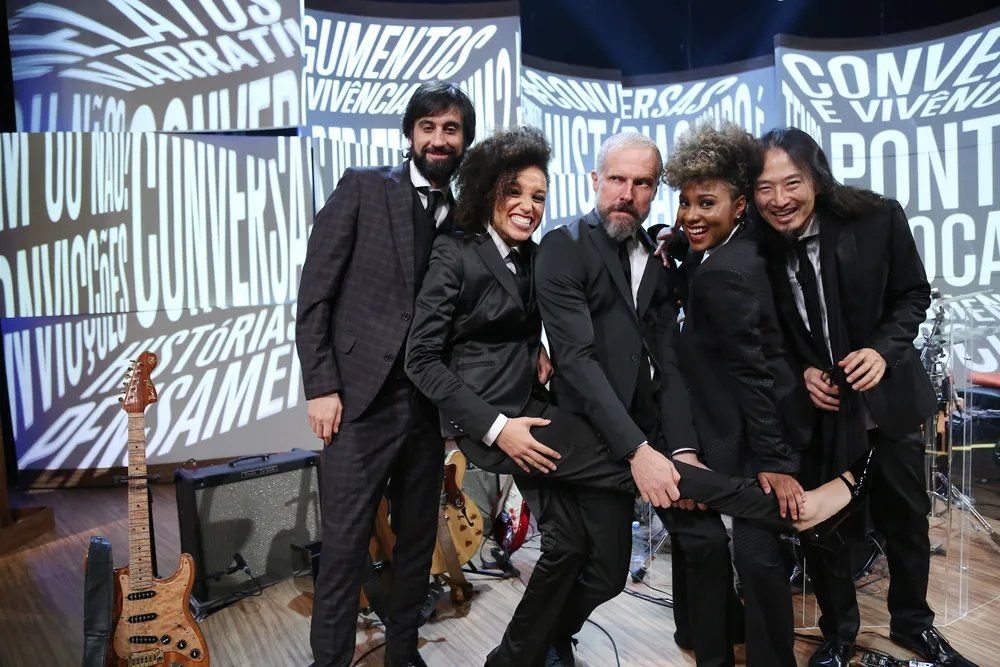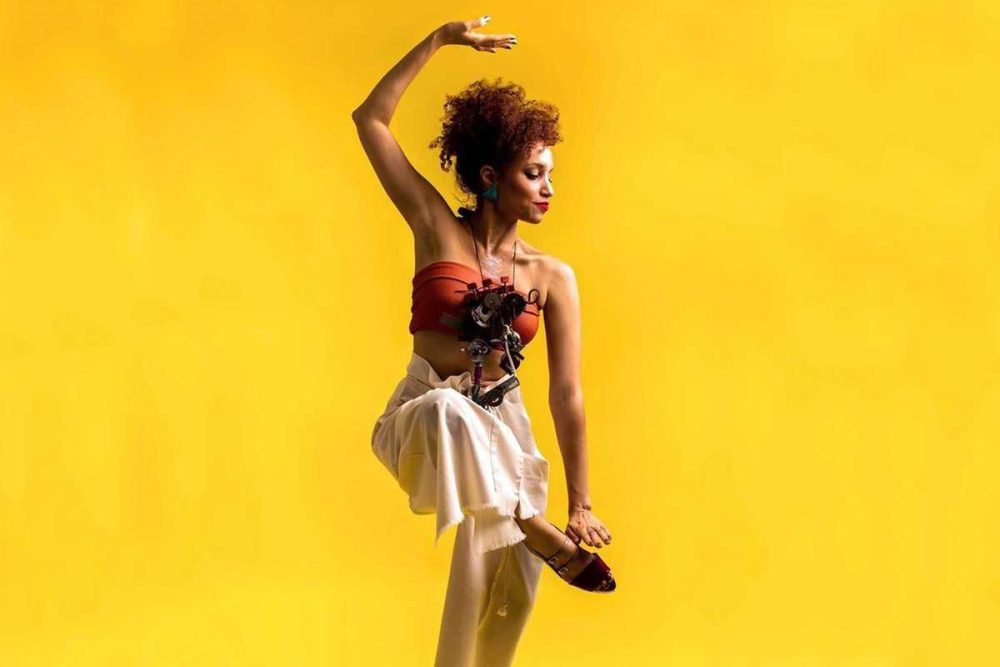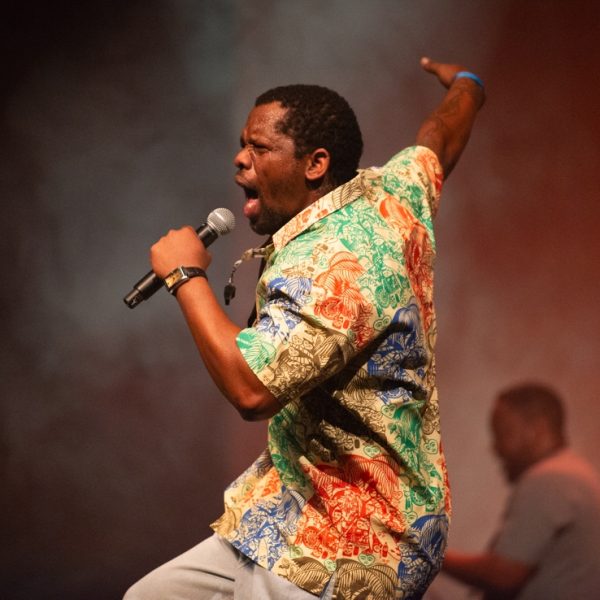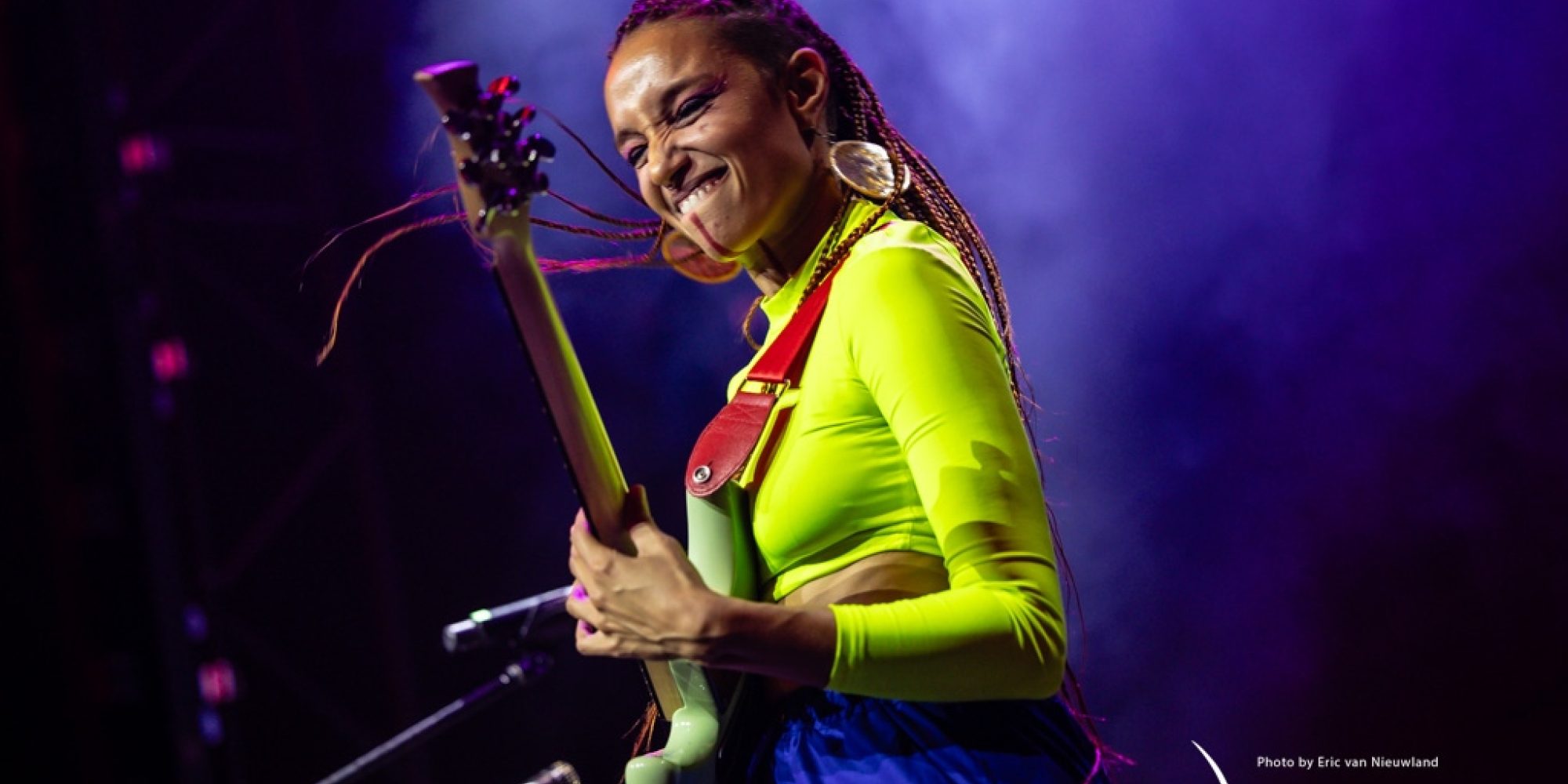One of the surprises at WOMEX this year, was not only a surprise for the audience, but for the artist as well, Brazilian singer/songwriter Anna Tréa. Tréa hadn't come to WOMEX to perform this year, but was on a standby list in case another performer canceled. When she arrived at the conference, and Togo funk legend Roger Damawuzan had to back out due to visa problems, she was asked to take over his time slot. And if there's one thing you learn quickly about Tréa is that not only welcomes a challenge, she runs towards it. So she had her guitar and equipment overnighted and spent the next few days preparing. And when she got on the stage at the Club Pelicano, with just herself and her guitar, she wowed the audience. And while the stage was big, she filled it with her presence and sound. So our first question to her was about how she was able to pull off that feat.
“It's crazy,” she says. “My story is kind of an odyssey because I was really shy when I was young. Really, like crazy, shy. People would talk to me and I would start crying. And it wasn't like I was three... this was when I was 12. It was really hard for me. And it's also crazy because I always knew I wanted to work with music, with communications, and I knew that it was the big challenge of my life. So, it's funny you commented on this now, because now I feel really, really.... that it's not 'filling the stage,' but being fulfilled by the stage.
“I always try to connect with people. For me, it's really important. I'm alone on the stage but I'm not alone, because I'm always trying to, you know, break the fourth wall, making an 'us' moment, not a 'me' moment. It's really important and challenging at the same time, because I mostly have songs written in Portuguese. So I try to connect saying things like 'This song is about....,' or use my body, so they can understand the moods. I've studied the instrument, dance, and singing and theater, so I try to communicate in all these different ways. But it comes. It comes because the necessity of communicating is so big. And the tools are here. And I'm always working hard to get better tools.”
Tréa’s story begins in Diadama, located at the southern edge of Sao Paulo, Brazil, which she describes as “the poor side of the town.” When she was eight years old, she saw a notice that a local cultural center was going to offer guitar lessons. And something inside of her screamed that she needed to take those lessons. But not only didn't she have a guitar to learn with, her parents were too poor to buy her one.
“So how am I going to do this?” she panicked. “It was going to start on Monday. But then on Friday, I came home, and my dad and mom opened the door, and I started seeing a guitar. And I was like 'What?!?' My aunts and family got the money together and bought me a guitar. It was really nice, but, you know, I didn't know how to play anything. I didn't have the strength to play it, so I started smelling it. I still remember the smell of my first guitar.”
She began taking the classes, and after learning her first three chords, she began composing songs.
“Love songs! Crazy love songs!” she laughs. “Like I was really dramatic. 'Forever! You and me forever!’ Oh my god, I was just so funny.”

Growing up, her early influences were the music she heard at home. Her mother was a fan of Caetano Veloso and Gilberto Gil, while her father, an amateur artist, tended to listen to a lot of new age music, like Enya, Kitaro, and guitarist Peter Ratzenbeck. Outside the home, Axé music, with its Afro-Caribbean, reggae and calypso influences, but especially the choreography of the dancing associated with the genre, she says, really influenced her rhythmic style.
“I always was really emotional and really physical with the music,” she explains. “I cannot listen to music and just [sit there], you know? I'm always moving and feeling it with the face, with the body, somehow. And always, whenever I can, I'm dancing.”
So how does a girl who is devastatingly shy find the tools to get herself to perform in public?
“I've always been very scared and insecure, but it seems I've also been really brave,” she admits. “But I was always, like, I need to do this. This is my life. I never doubted it since I was a kid. So if I wanted to communicate I needed to learn how to do that. My first concerts were really hard, really traumatic. My voice would be shaking all the time. I was trembling all the time. I didn't have control of the instrument and I couldn't communicate, not even with the guys that were playing with me. So it caused a lot of misunderstanding.
“And then, I start talking to myself: 'Anna, you know this is the thing you want to do for your life. So we need to understand what's the problem?’ When I was like 13 or 15, I discovered my way of playing. I realized the thing was that I was not really connected to what I wanted to say – that when you know what you want to say, whether people agree or not, it kind of doesn't matter. I was trying to show myself to people, but when I just let go of who I was and start focusing on what I wanted to say, it was way easier for me. Because it doesn't have to do with me. It has to do with the music, with the message. The thing is that I'm going up there to offer a gift. This is the sensation. A gift, like a Christmas gift. I'm going there to offer something that I really believe is good. It's like: 'Here, this is really cool. I want to give it to you.' So it's not about me. It's about the love I can give to people.
“I don't have to be perfect,” she continues. “It doesn't have to be perfect. It is about connection, and connection is not about being perfect. But what really connects us is the vulnerability. When I'm vulnerable, then other people can be vulnerable. I'm really into singing about vulnerability; the importance of being vulnerable that kind of touches you in a place – but it hugs you at the same time. You know? The idea is to say 'Look, it hurts in me too. So let's do it together.' It's about a triangle. I don't know if it's the best word, but it's about vulnerability, powerfulness, and movement or say action. It's about connecting the vulnerability to power. So the songs are about igniting yourself – about courage, being brave to show your vulnerabilities, bringing your stuff out as if it was the only thing the universe expects from you. Like you are really necessary. The thing is that if you're alive, it is because you have something to do, something to offer. And in the concerts, I try to create an atmosphere, where I kind of give power to people so they can enjoy it, so they can touch you and hug you.
“I think it's something we have kind of lost and I guess the arts kind of helps us bring it back, this sense of community. Because the way the society works is opposite to the natural way of living. We kind of put on some mask to go through life, but we need to take it off sometimes – otherwise we will lose ourselves. So I guess art is to remind us that we are not what we are trying to show. We are what we are when we take the mask off. So my concerts are a gift to let yourself go – to dance, to cry, to feel yourself, and to connect and fulfill yourself.”
She started gigging around Sao Paulo, doing open mic nights, playing with some local bands. Then, ten years ago, in 2013, she uploaded a video of herself covering the Earth, Wind and Fire song “September,” and it started to go viral. People, but especially producers and well-established artists, begin to call.
“So this was a dream actually,” she recalls, “because I always wanted to be part of a big band, play huge concerts, and things like that. You know, like putting the foot over the monitor and just going 'WAAAAA!!' with the guitar. I always wanted that. So I started playing with this with these two artists Emicida and Arrigo Barnabé and other independent artists from San Paolo.”
Emicida is an extremely popular, Latin Grammy-nominated rapper and activist, and is the focus of the 2020 Netflix documentary, AmarElo - It's Everything for Yesterday, and a recent Planet Afropop podcast. While on the other end of the musical spectrum, Barnabé was one of the main figures in the avant-garde movement of the early 1980's, known as Vanguarda Paulista, and is a proponent of dodecaphony, otherwise known as “twelve-tone” music. It is a complex tonal system credited to 20th Century composer Arnold Schoenberg, and has been utilized by such artists as John Cage and Frank Zappa. Suffice to say, it's not for your average, everyday musician to find a home in. But Tréa did.
“Emicida is so powerful,” Tréa says. “And Arrigo too. Really crazy and funny, but also the hardest concert I've ever studied. It's completely difficult, really difficult. But it gave me this consciousness that I was really powerful, that I had a lot of energy and power. I loved it, but also I felt like I was preparing myself to do it for my own art. I used to sing, but like small parts in the concerts. And not only guitar, but also playing the cavaquinho and percussion. So I was practicing to be, you know, out there. I was playing for 200,000 – a lot of people. So it was about being comfortable with this kind of situation. I was used to playing for 50, maybe 100 or 200 people, and then now I was singing for a lot, a lot of people. So crazy. And I was just 20 years old.”
Here's a clip of Tréa performing with Emicida.
Then she joined the house band of one of the most popular talk shows in Brazil, Conversa com Bial.

“On that show,” she recalls, “I played with the biggest artists from Brazil – Marcus Valle, Joao Donato – I played with everybody.”
Regarding her own sound, she calls herself an “Afropop” musician. So we had to ask her what that term means to her.
“In my case,” she says, “It is because I'm really about rhythm; I'm a rhythm person. And the rhythm comes from Africa, you know, it comes from my Black parts. And I'm really connected to this. So the guitar style is Afro, and at same time I feel my music is really connected to the pop culture, like, the chorus, the lyrics, the way of doing, the way of talking. I try to make it like more popular. So it's Afropop, because it's a pop song, but with this salsa... salsa that is Afro.”
In 2016, Tréa was ready to step out on her own. She received a grant to record her first album, Clareia, to be produced by Swami Jr., who won a Latin Grammy in 2008 for co-producing Omara Portuando's Gracias album, and he himself is an accomplished guitarist. But there was just one catch – she had only seven days of studio time to record it.
“I was traveling like crazy with Emecida and Arrigo and working with other artists,” she notes, “all while trying to work on my CD. So I was feeling pressured, like I need to do everything well with everybody and I need to do my CD well. I was really tired, traveling like to five places in three days, and you know Brazil is a huge place.
“So when I got in this place, which was a paradise to record my album, I was tired and tense and I was insecure. So in the first day, we tried the sound. Then, on the second day, we recorded one or two songs, maybe three. But the next day, I got sick. I was burnt out and had a panic attack. I was listening to my heart pounding. It was crazy, you know? So we needed to cancel that day. I felt worse and worse.
“I started writing to try to understand what was going on. People were trying to talk with me, but it was like my voice was gone. I couldn't speak. It was really weird and I was really scared. And then I started writing, and the first phrase that came to my mind was something like 'Is your gaze really where you are? Are you really seeing where you are? Are you really connected to where you are?'
“I had a song for the album, but I couldn't finish the lyrics because I didn't know what it was about. Now I saw I was not the same person anymore because I was pressuring myself. Lots of regrets. Lots of pressure. Thinking about the future. I was not present, you know? I was scared, but then I heard myself say: 'It's your time to fly. So you need to spread your wings. There's a new wind. It's a new moment. It's a new life. It's your time to fly. Spread your wings.' And this became the song. It's called 'Abre asas!' Spread your wings! I understood then I was writing the song I wanted to record for the album. I started crying and then my voice came back. It was like, if I hadn’t lived through this moment, this powerful moment, I would never have written this lyric.”
“It's a really important song,” she continues, “and it’s a song that connects me with people around the world. Everywhere I go I say this song is about courage. Even if they don't understand the lyric they understand the message. Everybody needs courage every day – maybe just to get out of bed, you know? Everybody knows what kind of challenge I am talking about. I have my challenge. You have yours. Everybody has theirs. And the song is about embracing these challenges. And it is about celebrating your own victory. Because only you know what's your challenge. I don't know what it is. So only you can celebrate when you get some new point of view, when you win. Sometimes you may feel really fragile because others don't understand what you're dealing with and they kind of hurt you. So you need to have this courage.”
A few years ago, Tréa decided to move to Barcelona, Spain. Since then, she's been finding her place in her new home. This year she was chosen to be on La Voz, the Spanish version of the television show The Voice. While she didn't win, it did introduce her to a new world of fans.
In recent years, she has begun some interesting collaborations with some interesting artists, including Angolan-French singer Lucia de Carvalho and Catalan pianist Clara Peya.
Tréa is completing work on her sophomore album to be released in 2024, and will start releasing some singles around March. She is also planning a European tour in the summer.

Related Articles










